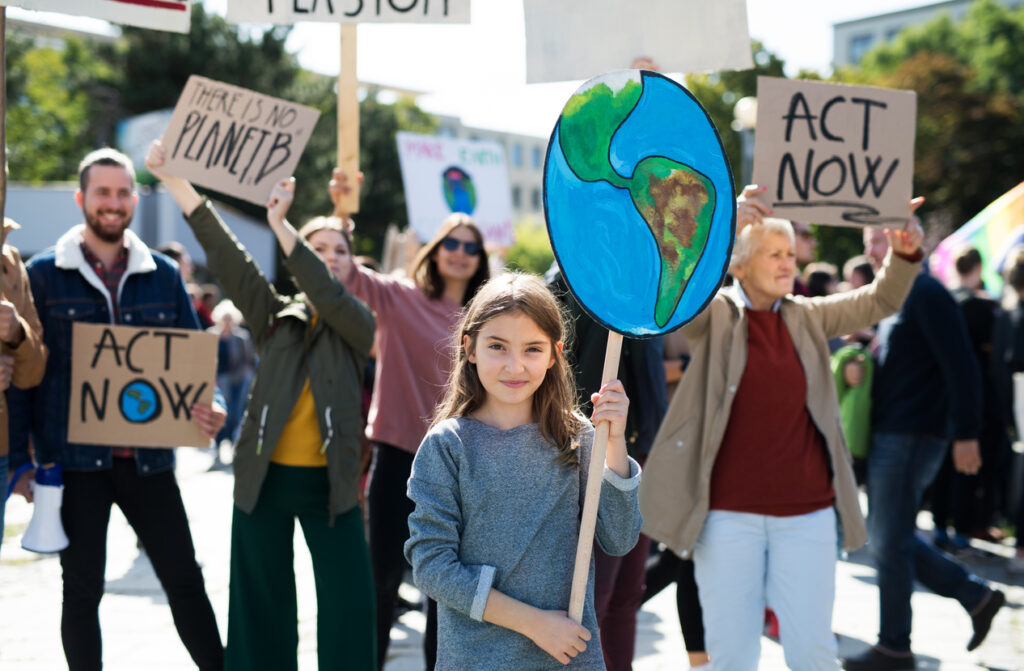You won’t believe the shocking threats the next generation is up against until you see this list.

You thought we had it rough when we were growing up? Between the Cold War drills, walking home without a phone, and limited job options, it seemed like we had our fair share of challenges. But even with all of that, the world we grew up in still felt more stable, more personal, and—believe it or not—simpler in so many ways. The pressures we dealt with, while real, were grounded in slower-moving trends and smaller-scale risks.
Our grandchildren are entering a world where the pace of change is dizzying, and the dangers are more subtle but deeply ingrained. They’re facing problems we never could’ve dreamed of—issues tied to the digital world, environmental collapse, and emotional overload. While we want to believe every generation adapts, what lies ahead for them isn’t just difficult—it’s frightening. Here are 12 terrifying realities they’ll be up against in their lifetime.
1. Social Media Will Dictate Their Self-Worth

When we were kids, we only had to deal with the judgments of a small group of classmates or neighbors. Today’s youth, on the other hand, grow up in a digital fishbowl where their every post, picture, and opinion is scrutinized by a potentially global audience, as stated by writers at NCHS. It’s not just about sharing updates—it’s about curating a life that others will like, validate, and follow. This constant pressure to gain approval from people they may not even know can chip away at their sense of identity.
The scary part is that their self-esteem will be built not on real-world accomplishments, but on algorithms and likes. They’ll grow up feeling inadequate if their photos don’t perform well, or if their lives don’t seem as exciting as those they see online. The mental toll of this comparison game is immense, and unlike anything we had to face. Without strong support systems and digital literacy, they could be trapped in a cycle of never feeling “enough.”
2. Climate Change Will Be Impossible to Ignore

What we used to call “global warming” is now a daily crisis for the next generation, as shared by experts at WWF. They won’t read about climate change in textbooks as some abstract concept—they’ll live through it. Rising sea levels, devastating droughts, massive wildfires, and deadly floods won’t be rare news events—they’ll be part of the backdrop of their everyday reality. Nature, once a refuge for peace, will become unpredictable and, at times, dangerous.
They’ll inherit a planet that is both beautiful and broken, and they’ll be forced to make hard choices about where to live, what to eat, and how to survive. Climate migration, resource scarcity, and eco-anxiety will be real parts of their lives. It’s no longer about reducing plastic—it’s about fighting for a livable future. And that’s a burden far heavier than we ever carried at their age.
3. Artificial Intelligence Will Threaten Their Job Security

We worried about outsourcing or downsizing, but they’ll be competing with machines that don’t sleep, get sick, or ask for raises. Artificial intelligence is moving at such a rapid pace that it’s reshaping entire industries before some kids even get to high school, as reported by writers at GoGuardian. Traditional career paths—like accounting, customer service, or even some areas of medicine—may be largely automated by the time they graduate.
This doesn’t just mean fewer jobs; it means an entirely new economic landscape where creativity, adaptability, and tech fluency will be essential. They’ll need to constantly reinvent themselves, learning and unlearning skills to stay relevant. The mental load of having to keep pace with technology just to survive financially will create an unrelenting pressure that could lead to widespread burnout and disillusionment.
4. Cybersecurity Threats Will Be a Constant Fear

In our youth, the biggest danger was a stranger in a van. For them, the threat is invisible, digital, and always lurking. Hackers can steal their identities, access their private photos, or drain their bank accounts—all from across the globe. With everything from medical records to school transcripts stored online, their personal information will always be vulnerable.
They’ll have to be experts in digital safety just to protect themselves, yet the rules and threats are always changing. The fear of being doxxed, scammed, or impersonated online will be a shadow over their daily lives. Trust will become harder to earn, and privacy will feel like a relic of the past. It’s a level of vigilance that we never had to maintain just to feel secure.
5. Privacy Will Become a Thing of the Past

We used to cherish privacy—locking our diaries, closing our doors, choosing who got to see our photos. For our grandkids, privacy might not be something they ever truly experience. Smart devices will track their every move, facial recognition will log their expressions, and every click or scroll will be stored and analyzed. They’ll leave digital fingerprints everywhere they go, often without even realizing it.
The real danger lies in how normalized this lack of privacy will become. They may not know what it feels like to just exist without being watched or measured. The ability to unplug will become a luxury few can afford, especially as school, work, and social life all depend on being constantly connected. In this world, the line between public and private could vanish entirely.
6. Political Divisions Will Shape Their Friendships

Disagreements over politics were once things people could laugh off or avoid at dinner parties. Today, the ideological divide runs so deep that it’s creating rifts in families, classrooms, and communities. Our grandchildren will grow up in a world where political alignment could determine who they’re allowed to be friends with, who hires them, or even who they feel safe around.
Social media only intensifies this division, placing people into echo chambers and rewarding outrage over empathy. They’ll be pressured to pick a side, even before they fully understand the issues. Saying the “wrong” thing could lead to social exile. The challenge won’t just be understanding the world—they’ll have to navigate it without losing their sense of self or alienating those they care about.
7. Mental Health Struggles Will Skyrocket

We brushed off stress or sadness as “just life,” but for them, mental health issues will be front and center. Anxiety, depression, and burnout are already on the rise among young people, and the future looks even more overwhelming. The relentless pace of life, combined with digital pressures, economic stress, and global instability, will push their emotional resilience to its limits.
What’s even harder is that they’ll often be expected to perform as if everything is fine. The pressure to succeed, look happy online, and stay “productive” can leave little room for healing. Mental health support may still be stigmatized or inaccessible for many. They’ll have to work much harder than we ever did just to stay emotionally balanced, and that is a heavy emotional cost.
8. They’ll Face a Heavier Financial Burden Than We Ever Did

We thought balancing a checkbook or paying off a car was stressful, but they’re entering a world of economic chaos. Skyrocketing tuition, soaring rent, and stagnant wages will combine to make financial security feel like an illusion. They may never be able to afford a home, save for retirement, or even cover medical expenses without lifelong debt.
Worse still, the traditional financial milestones—buying a house, starting a family, planning for retirement—might be permanently out of reach. They’ll have to redefine what “success” looks like while battling feelings of failure or inadequacy just for struggling to make ends meet. The financial playing field has shifted so drastically, they’ll need creativity and grit just to survive, let alone thrive.
9. Global Pandemics Will Become the New Normal

For us, COVID-19 was a once-in-a-lifetime event. For them, it could be the first of many. With global travel, population density, and environmental disruptions on the rise, pandemics may become a recurring threat. Their world will require constant vigilance, frequent health screenings, and the ability to pivot quickly during outbreaks.
Living in a state of health anxiety could reshape how they interact, learn, and even love. Masks, remote work, and canceled events could become regular parts of life. Their childhood memories might be peppered with lockdowns and disruptions, and this could leave lasting emotional scars. Public health won’t just be a field of study—it’ll be an everyday survival skill.
10. Technology Addiction Will Be Harder to Escape

Back in the day, our screen time was limited to cartoons and maybe a Saturday night movie. Their world will be completely immersed in technology—smartphones, tablets, AR glasses, and VR headsets. It’s not just about being online; it’s about never being able to truly disconnect. Even schools and social lives will depend on digital platforms.
This kind of constant engagement rewires the brain, affects sleep, and can dull real-world experiences. They’ll struggle to distinguish between what’s real and what’s digital. Learning to unplug and be present will be one of the most important—and most difficult—skills they’ll have to master. Without it, their mental and emotional well-being could suffer in ways we’re only beginning to understand.
11. Automation Will Make Relationships Feel Less Human

AI isn’t just replacing jobs—it’s starting to replace connection. Our grandchildren may rely more on digital assistants and chatbots than actual human interaction. Whether it’s online therapy, customer service, or even companionship, there’s a real risk that their relationships will become more transactional and less emotionally rich.
While these tools can be helpful, they also risk eroding our need for empathy, patience, and vulnerability. If they grow up feeling more comfortable talking to machines than people, emotional intelligence could decline. Human connection takes effort, but it’s also what gives life meaning. They’ll need to actively seek it out in a world designed for convenience.
12. Global Instability Will Impact Their Everyday Lives

For us, global crises felt distant—something happening on the news, far from home. For them, instability will hit closer and more frequently. Economic collapse, political upheaval, and natural disasters won’t just be headlines; they’ll be events that shape their daily routines, their access to resources, and their sense of safety.
They’ll grow up knowing that what happens halfway around the world can change the price of groceries, the safety of their neighborhood, or the job market overnight. Resilience and adaptability will become crucial life skills. But living in that kind of unpredictability can breed fear and anxiety. They’ll have to find ways to build stability in a world where it’s in short supply.
